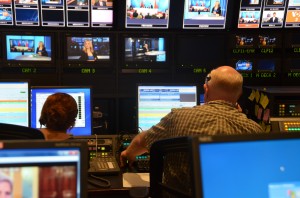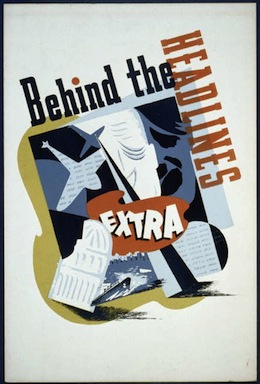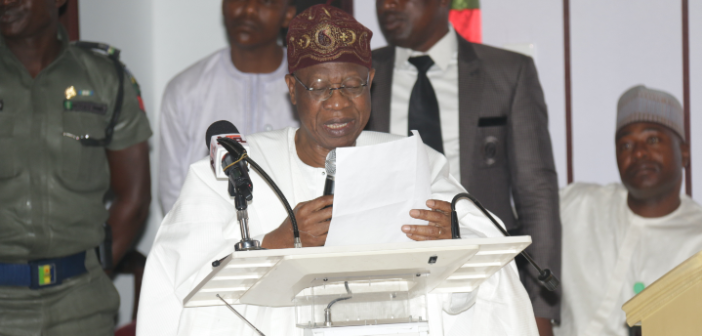BBG Watch Commentary
A journalist who until recently worked at the Voice of America African Division has commented to BBG Watch on accusations by a Nigerian government minister that VOA Hausa Service may be inadvertently helping Boko Haram terrorists because VOA’s current journalistic output frequently lacks balance, objectivity and professionalism. Similar allegations were published by a VOA listener in Nigeria in an open letter to President Obama. A BBG official dismissed concerns over VOA programs to Nigeria raised by the Nigerian Minister of Information and Culture, Alhaji Lai Mohammed, as “pretty absurd.”
A Voice of America journalist who until recently worked in the VOA African Division and left in frustration over a poor state of management and journalism at the Voice of America told us that he shares the Nigerian government minister’s misgivings over VOA reporting and can confirm that much of VOA Africa Division program content does not meet the requirements of the VOA Charter. The journalist does not wish to be identified by name because many of his friends still work at VOA. His comments are not specific to VOA Hausa Service, as he did not work there, but are based on observing how journalists and broadcasters work in other VOA Africa Division services and throughout the Voice of America.
###
Voice Of America Must Improve Its Journalism And Respect Its Charter
By A Former VOA Africa Division Broadcaster
The Voice of America and the Broadcasting Board of Governors have the obligation to refocus their efforts on making sure news reports are properly sourced, balanced and edited. We have heard from current and former staffers that for a number of years now, the exacting standards for which VOA used to be known have been neglected.
Staffers have reported that news items are aired after being copied and pasted from wire services; they have reported that “editing” can consist of an editor opening and quickly perusing copy before approving a text, without bothering to check sources, which may not even be submitted to his/her attention. Some staffers are left to work alone and told to “self-edit.” Other employees are tasked with so many responsibilities they loose track of their many obligations and just try to “get the story out,” at any cost.
We have noted for a number of years the deterioration in the quality of the material put out by VOA. This should be a reminder that it’s time for the Voice of America to refocus on its Charter, which provides first and foremost that:
“VOA will serve as a consistently reliable and authoritative source of news. VOA news will be accurate, objective, and comprehensive.”
The bloated IBB bureaucracy should not compromise the VOA’s mission by failing to give employees on the front line of news gathering the means they need to better respect the Charter.
###
NIGERIAN FEDERAL MINISTRY OF INFORMATION AND CULTURE
Minister tasks VOA Hausa Service on balanced coverage of Boko Haram
The Minister of Information and Culture, Alhaji Lai Mohammed, has appealed to the Voice of America (VOA) to ensure a more balanced coverage of the Boko Haram insurgency by its Hausa Service.
The Minister made the appeal in Abuja on Tuesday while receiving a delegation from the African Division of the VOA, led by its Director, Mr. Negussie Mengesha.
He noted that there had been allegation that the Hausa Service of the VOA’s reporting of the war
is being skewed in favour of the insurgents, and urged the international broadcaster to correct the perception.
“The Voice of America is very popular in Nigeria, and for many years, the Voice of America has been seen as the veritable voice of cooperation, partnership and friendship to Nigeria. I can say that in the Northern part of Nigeria in particular, the Voice of America is listened to very religiously.
“However, I must say that in recent times, there have been lots of complaints about the Voice of America from the same part. People have not been too happy about the way the insurgency has been reported in recent times,” Alhaji Mohammed said.
He noted, however, that in spite of the allegations, the VOA remains the favourite channel ”for many of our brothers and sisters in the North”, particularly during the time of the insurgency, which significantly affected the capacity of the local broadcasters to reach out to the people.
“When I read the article (on the VOA coverage of Boko Haram), I said it could mean two things. One, that the Voice of America is still very relevant in Nigeria and, secondly, the perception out there is that the audience probably wants more of balancing of stories than anything,” the Minister said.
He commended the VOA for its various capacity building programmes for journalists in the country and stressed the need to have an exchange programme between the American broadcasting organization and Nigeria’s public broadcasters.
Alhaji Mohammed also lauded the VOA for expanding its reach through the Social Media, saying: “Social Media today is so pervasive. It might not be believed by all but the penetration is probably deeper than that of the conventional media. It is instantaneous, viral and it has no boundary. I must commend you for your effort to move from radio to a multi-media platform,” he said.
Responding, Mr. Mengesha denied the allegation that the coverage of the Boko Haram insurgency by the VOA Hausa Service is slanted in favour of the insurgents.
“I think the Hausa Service is the real enemy of Boko Haram. The entire Northern Nigeria has been affected by this crazy madness and in fact we took one of our reporters and kept him for six weeks in Northern Nigeria to have first hand investigative reports and he did an excellent job,” he said.
Mr. Mengesha, who said he was disappointed by the allegation contained in an article published in the Daily Trust of Saturday, March 5th, however expressed the readiness of VOA to correct the perception.
For his part, the Managing Editor, Hausa Service of the VOA, Mr. Aliyu Mustapha, dismissed the allegation of biased coverage of the insurgency by the Service as reflected in the said article as ”unsubstantiated”, and assured that the VOA will continue to partner with Nigeria to build on the successes it had recorded in the anti-terror campaign.
Also at the occasion, Ms. Joan Mower, Director, Development and International Media Training for the Broadcasting Board of Governors, commended the Nigerian media for the enviable role it played towards the eradication of polio in the country, adding that journalists from other countries would soon visit Nigeria to understudy the role of the country’s media in that regard
Segun Adeyemi
SA to Hon Minister of Information and Culture
Abuja
March 8th 2016
###
Posted by Joan Mower on Tuesday, March 8, 2016
Joan Mower wrote in a comment on her Facebook page which also shows a photo of her pointing a finger at the Nigerian Government Minister:
“Yea I was telling him it was pretty absurd to criticize VOAs Boko Haram coverage! We’ve been out front on the whole story. Blame the messenger again. Nice guy though.”
###
An additional response to the Minister of Information and Culture Alhaji Lai Mohammed’s remarks was provided on March 15, 2016 by the Broadcasting Board of Governors Office of Public Relations.
Thank you for your letter requesting information based on a letter to the editor in the Nigerian newspaper, Daily Trust, and a following statement by the Nigerian Minister of Information.
When referencing the Daily Trust piece, the Minister indeed noted the allegation that the Hausa Service’s reporting of the war is skewed in favor of the insurgents. However, he also added, “The Voice of America is very popular in Nigeria, and for many years, the Voice of America has been seen as the veritable voice of cooperation, partnership and friendship to Nigeria”.
That cooperation and partnership with the people of Nigeria is as strong today as it ever was. It is the foundation of our work in every country. In fact, the Nigerian First Lady recently celebrated International Women’s Day by appearing on Yau da Gobe, a program on VOA Hausa. As with many international networks, VOA prides itself in providing balanced and objective news to our audience. It is not unusual that governments and special interest groups have not appreciated the news we provide in their communities. We cover the news that is … not the news people may wish to see or hear.
The brave staff and stringers of VOA Hausa who constantly receive death threats from Boko Haram and put their lives on the line almost on a daily basis deserve our support and gratitude. They are committed to covering the atrocities brought upon innocent people by this terror group, as well as efforts by the government and communities in response to those atrocities. We are dedicated to supporting their efforts and aim to continue producing timely fact-based news on both sides of this unfortunate issue.
Scot Riddlesberger
Acting Director, Public Relations
Rm. 3453
330 Independence Ave., SW
Washington, D.C., 20237
voanews.com/insidevoa.com
###
A former senior VOA News correspondent and language service chief offered these comments:
The response from the BBG spokesperson is typical of the kind of thing one gets from the Agency, which has above all a primary interest in defending the organization from criticisms. The issue raised by the Nigerian minister’s remarks raises questions about the journalistic soundness of VOA Hausa Service material. Similar questions have been raised over the decades about numerous other of VOA’s language services.
The BBG spokesperson throws around words like “coopereation” and “partnership” and brings the Nigerian First Lady into the mix saying she appeared on VOA airwaves. It reads almost like a propaganda sheet from a former East bloc government like East Germany. The fact that BBG and VOA services have been touchy feely with a foreign government does not relieve BBG of the responsibility of thoroughly examining the issue raised by the criticism at hand.
Indeed, missing from this response are the words: we will look into the concerns and issues raised by the minister’s criticism and issue a public followup about the results. But that is typical of the unaccountable BBG — where the rule appears to be first to issue dismissive response to any criticisms, and investigate later, if at all.
###
VOA HAUSA: OPEN LETTER TO PRESIDENT OBAMA By Bala Muhammad | Daily Trust | Publish Date: Mar 5 2016 5:00AM
This week, a reader going by the name Audu Gagara …, worried that VOA Hausa appears to be pursuing an unwholesome agendum, writes an open letter to President Barack Obama and shared same with this column. It’s worrisome enough to appear here:
VOA HAUSA: OPEN LETTER TO PRESIDENT OBAMA
Voice of America
Dear Mr. President:
I was born and bred in Gashu’a, a town in Yobe State, northeastern Nigeria, one of the states ravaged by Boko Haram (BH) insurgency. I grew up to find your country, the United States (US), through the Voice of America (VOA) Hausa Service, speaking to my people thrice a day – morning, afternoon, evening. As kids, we would sit with our elders as they glued themselves to their radio sets so as not to miss a word from the broadcasts. We grew up as radio listeners on our cheap Kchibo transistors; and VOA Hausa had a pride of place among its peers. Through these broadcasts, the US spoke directly to us; we were able to catch a glimpse of US’s history, diversity, ideals, principles, foreign policy and other aspects of life in your Land of Freedom. In those days, VOA Hausa was very informative and educating, as it was entertaining. It was also very professional.
Unfortunately, Mr. President, VOA Hausa is today a shadow of its former excellent self, a mockery of what it had been. Today, VOA Hausa is everything but professional. It lacks professionalism, tact and objectivity. Its inefficiency and ineffectiveness became more glaring, and in a most striking manner, from the early days of the BH insurgency. It is on this that I would like to draw Your Excellency’s attention.
I choose to write this open letter to you because this issue is very important to me and, perhaps, it may be of interest to you too, considering the tremendous effort you are exerting in trying to cultivate the friendship of Muslim peoples all over the world. There is a dangerous trend going on at VOA Hausa, perhaps US’s strongest connection with Hausa-speaking Muslim communities in Africa and, as I mentioned earlier, this worrisome trend began with the rise of BH.
To begin with, in the last three to four years, during the time when BH vehemence was at its highest and severest, VOA Hausa clearly appeared to celebrate the ‘exploits’ of the insurgents. In fact, its reporting of events seemed to exaggerate BH’s ‘successes’ and to downplay our military’s accomplishments. VOA Hausa would trumpet the group’s attacks, often inaccurately, and would usually amplify and repeat the group’s messages throughout the day. From the way things have unfolded in the last few years, the insurgent group may be said to have as ‘friends’ VOA Hausa, apparently basking in satisfaction on how well their ‘successes’ were being reported, nay celebrated, by the station. The style of the coverage of the Chibok Girls kidnapping, for example, left a lot to be desired as VOA Hausa showed a lack of empathy and compassion.
While we all know that that these poor girls are still missing, VOA Hausa’s monotonous coverage does not inform listeners on how the girls’ parents are coping, for example, or how the communities affected are resettling. One may have to tune in to other stations to learn that some of the girls who managed to escape that horrific nightmare are doing well at the American University in Nigeria, Yola, and in the US, so near you Mr. President. One would have thought VOA Hausa would celebrate US’s successful diplomacy in this matter, unless of course IT IS THE US ITSELF that dictates otherwise. The US may perhaps be doing several great things to counter BH and similar groups, but VOA Hausa appears to have no shred of interest in reporting such laudable efforts. For instance, about two weeks ago a team from the US Institute of Peace visited Nigeria’s President Muhammadu Buhari and, a few days later, the United States Agency for International Development (USAID) announced it would support Sokoto and Adamawa States in empowering their youths. Surprisingly, and to the best of my knowledge, neither of these stories was reported by VOA Hausa.
Mr, President, isn’t it ironic that one has to tune in to VOA Hausa’s rival stations such as the BBC, DW and RFI to know what the US is doing to help us defeat insurgency and empower our people? It then strikes me that perhaps VOA Hausa is out to undermine the very good work you are doing; or else why wouldn’t they highlight the good work the US and the whole world are doing in combatting terrorism? Why does VOA Hausa only concentrate on reporting the activities of this particular Nigerian insurgent group? Is there a hidden agenda? Is the US speaking from both sides of the mouth? Is it running with both the hound and the hare?
To us, VOA Hausa has become the perfect platform for BH to spread its message of terror. The station seems to be succeeding in giving BH some form of legitimacy, and appears to be an intimate friend of the insurgents – this much was admitted by a leading personality of the station who confidently stated that they are “a friend” to BH during a presentation on “Combating Boko Haram” at the American Foreign Service Association Conference Centre in Washington, DC, on 10th August, 2015.
In addition to all this, Mr. President, the low quality of VOA Hausa Service is first-class. In this age of technological advancement, the station appears to be stuck in 19th Century journalism. Its reports are often late and are usually direct translations from the English without context or depth. It is painful that the platform which many of us grew up adoring has today become a joke; a place where mediocrity thrives and where amateur and untrained broadcasters with limited understanding of the language are perhaps being used to promote some personal agenda.
Furthermore, it appears that there are multiple voices on the platform which indicate lack of focus and direction. Recently, VOA Hausa launched a TV platform but, like its radio counterpart, it totally lacks creativity, vision and direction. After watching its programmes for some time, one would begin to ask oneself, “Do American taxpayers enjoy paying for something without returns?”
Couldn’t VOA Hausa, for example, take a cue from PBS, another US media entity, whose recent special report “Poverty, Corruption Fuels Boko Haram” (which aired in November 2015) was an excellent piece of journalism and was well received? Yet, as far as I know, VOA Hausa has not seen it fit to translate and broadcast that particularly well-researched report which, if it were rendered in Hausa, would make tremendous impact based on content, quality and professionalism. And we are NOT even asking for something original – just copy and paste, translate some good report.
Alas! Mr. President, Nigeria is in the era of combating both terrorism and corruption, and you have openly pledged to support our country on both fronts when our president visited you last July. We believe a lot of good that can be achieved through a positive VOA Hausa which used to be a household name across Hausa-speaking communities in Africa. But we are very worried that the station seems to be giving too much undeserved publicity to Boko Haram with no commensurate empathy for victims, our military or even your own country’s assistance. Mr. President, the US doesn’t have too many friends, and VOA Hausa seems to be subtracting the ones that you do have. Perhaps their action is sanctioned by higher authority – but perhaps not; that it’s only a failure of supervision and control. If it’s the latter, we bring it to your attention. Bring VOA Hausa to order.
Sincerely yours.
READ ORIGINAL DAILY TRUST ARTICLE: VOA HAUSA: OPEN LETTER TO PRESIDENT OBAMA By Bala Muhammad | Publish Date: Mar 5 2016 5:00AM, Daily Trust



